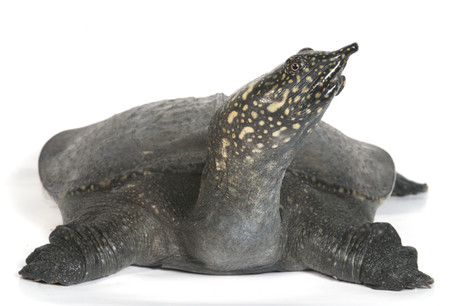Go easy on the soft shelled turtles in your menus

Soft shelled turtles, which are farmed for human consumption in China, are now strongly implicated for spreading cholera.
The pathogen Vibrio cholera has been found to colonise both the intestines and surfaces of soft shelled turtles.
The World Health Organization reported ,231 deaths and 190,549 cases of cholera across the globe in 2014, while 600,000 cases were reported in 2011. According to National Geographic, there have been nearly 800,000 people infected and 9000 deaths in the current Haitian outbreak that commenced in 2010.
Fewer than 200 cases of cholera have been recorded in China in the last 10 years but surveillance of the disease by the Chinese Center for Disease Control and Prevention, Beijing, has established that consumption of cholera-carrying soft shelled turtles has caused outbreaks of the disease. The O139 Vibrio cholera serogroup, the major strain spread by the turtles, is known to have epidemic and pandemic potential and is listed in the most dangerous category in China’s Law of Infectious Disease Control and Prevention.
The researchers inserted genes producing bioluminescent proteins into V. cholerae enabling them to directly observe the pathogens colonising the turtles. To infect the turtles, the investigators dipped them in a phosphate buffered saline solution containing the now bioluminescent bacteria, serogroup 0139.
Over the next four days, the researchers checked the turtles at 24-hour intervals. They first detected light signals at 24 hours. At 96 hours, the entire dorsal side of the turtles’ shells was emitting bioluminescence. The latter was also easily detected on the dorsal side of the turtles’ limbs and necks, and in the calipash, the gelatinous protoplasm, locally regarded as a delicacy, that lies directly beneath the shells’ surface.
Determining intestinal colonisation was more difficult. The turtles were inoculated intragastrically with the bioluminescent V. cholerae. Knowing that digestion takes roughly 34 to 56 hours in 150-gram turtles, the investigators euthanised and dissected the turtles at 72 hours and checked all their internal organs. Bioluminscence could be detected only in the intestines.
The investigators also identified the different colonisation factors — molecular machinery on the surface of V. cholerae — that enabled the bacteria to stick to the turtles’ dorsal surfaces and intestines.
A side benefit of the study is that the soft shelled turtle could serve as a new animal model for studying how V. cholerae interacts with aquatic hosts. Unlike other aquatic models such as zebra fish, soft shelled turtles can be anaesthetised and their surfaces sampled out of water for relatively long periods without killing them. Using aquatic models is particularly beneficial since cholera is a mostly waterborne disease.
The research has been published in Applied and Environmental Microbiology, a journal of the American Society for Microbiology.
Career upskilling: from food to product development chef
Former chef Zach Baudinet decided to take his years of food experience to the next level through...
A taste of flavours on trend in 2024
Understanding the flavours, ingredients and trends that will shape what we consume is essential...
What's new on the shelf this Easter?
Paper artwork-inspired chocolate eggs, sweet chilli products on show and bite-sized Polly Waffles...












